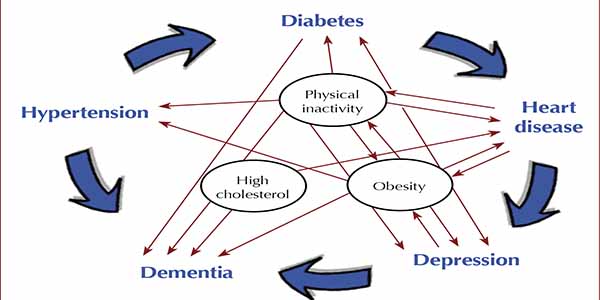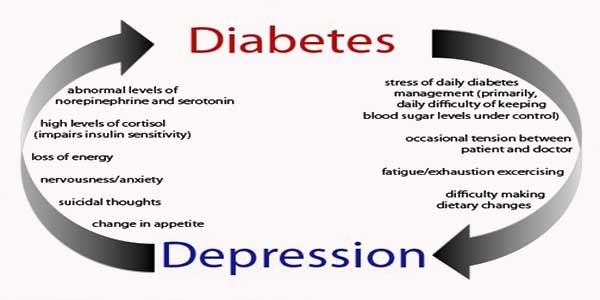The more medical science advanced in the 20th century and now in the 21st, the more doctors realized the many links between physical and mental states. If someone is experiencing a great deal of stress in their lives, for instance, that makes physical manifestations just as likely as mental ones.
The opposite is true, as well. If someone is going through physical problems, it’s harder for them to keep a positive outlook. It follows that they might become anxious, depressed, or worse because of what they’re going through physically.
One prime example of this is what doctors have discovered about depression and diabetes. We’ll go into a little detail on that in this article.
Navigator
What Doctors Know About Type 2 Diabetes
Type 2 diabetes is:
- A chronic condition that affects the body’s glucose (blood sugar) production
- When the body resists insulin or does not produce enough
Doctors have known for a while that diabetes runs in families. They understand that those dealing with it can experience blurred vision, fatigue, hunger, frequent urination, and increased thirst. If there is diabetes history in your family, you’re also more likely to contract it.
All those are physical symptoms. But what doctors are only recently realizing is that there’s a link between diabetes and depression. Diabetes worsens depression, as it turns out, while depression contributes to diabetes.

What is Depression?
As for depression, it is:
- A mental health disorder
- When you’re no longer interested in daily activities or actively engaging in your life
If you struggle with depression, you might find it challenging to get out of bed in the morning to deal with your routine. Doctors still don’t agree one hundred percent on what causes depression.
It could be certain neural circuit altered activities that change your brain’s functioning. Genetic indicators do often play a part, much like diabetes.
If you’re depressed, you might deal with sleeplessness or sleeping too much. You might display irritability or extended bleak or manic periods. You might have self-esteem problems and feel that you’re worthless, or no one wants you around.
How Does Depression Connect with Diabetes?
If you’re depressed, but a doctor or therapist does not diagnose you, then it’s highly likely that you will self-medicate. You might use illegal drugs, alcohol, and also things like sugar or carbohydrates. Sugar gives you a brief artificial pick-me-up, and it’s readily accessible and inexpensive.
Carbohydrates, on the other hand, like potatoes, white bread, and pasta, are not necessarily the worst thing in the world, provided you eat them sparingly. You should stay away from refined sugars and eat whole-grain bread or whole-wheat pasta.

However, if you’re using food to self-medicate, you’ll leave yourself open to weight gain, making Type 2 diabetes more likely. In this way, you can see how one leads to the other.
These are self-perpetuating activities. You experience depression, and you eat more unhealthy foods and don’t exercise as much. You gain weight and leave yourself open to Type 2 diabetes.
Because you have diabetes, you’re limited in the exercises you can do, which only makes you experience deeper and more acute depression. On and on the cycle goes.
How Can You Break this Pattern?
Much like alcoholism or any similar malady with which you might struggle, you usually have to seek help before you get anywhere on your recovery journey. When you see a doctor, you’ll have to talk to them about your eating habits and depression.
It is not likely to be easy, but hopefully, your family will be there to support you once you’re ready to talk about these things.
The doctor might recommend that you talk to a therapist. They can discuss your triggers with you: the stressful life aspects that might make you eat unhealthy foods or indulge in alcohol or drugs.
Reducing your life’s stress and trauma is sure to go a long way toward helping you with both your depression and Type 2 diabetes. In a year when the pandemic has pushed everyone’s fortitude and resilience to the absolute limits, you’re not the only one coping with these issues.
The therapist might put you in touch with a physical trainer or nutritionist to retool your diet. At the same time, you might go to therapy once a week, or more, till you’re past the crisis point.
It is possible to turn your life around via both your mental and physical health. The most vital way to start is by acknowledging the relationship between the two.
Sarvyoga Takeaway
It is highly advisable to seek medical help from a certified therapist. You shouldn’t just google and be your own doctor, rather take a proper medical treatment for depression. A diabetes patient might invite other illness as well, so take good care of your body, mind, as well as your soul.

